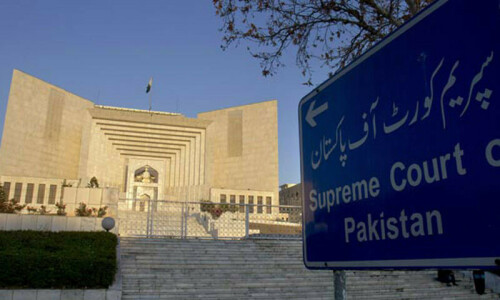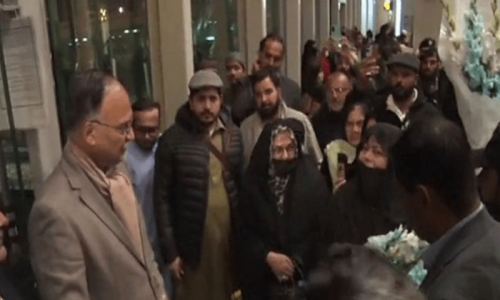
ALL praises to the Almighty that the people of Pakistan have been blessed with two history-making judgments of the apex court and this within a matter of days.
The more momentous of the two verdicts has ended the months-old agony of Syed Yusuf Raza Gilani by pushing him off the prime ministerial gaddi. Since the issue was contempt of the highest court in the land the verdict was not unexpected, though the scale of punishment is.
While all Supreme Court verdicts must always be honoured even if they do not appear to be sound, it may not be possible to avoid a prolonged discussion on the present judgment. There are quite a few issues that will need to be clarified.
Only time will tell, after the current wave of emotional frenzy has subsided, whether this judgment will be viewed as a vindication of the judiciary’s authority or as an avoidable encroachment on the political domain of parliament, and whether the majesty of law only means the majesty of judges. It hardly needs to be said that history has not always upheld crucial judicial decisions, however popular they might have been in the first instance.
To say this does not mean siding with Mr Gilani and his party; it only means that regardless of any party’s guilt, justice must not only be done, it should also seen to be done. Besides, whatever the circumstances the near total eclipse of parliamentary institutions is a prospect even a stable and disciplined state cannot afford. The consequences to Pakistan cannot be viewed with equanimity. The ouster of a prime minister on a non-political charge calls for solemn reflection and not dancing in the streets.
The PPP as the major partner in the ruling coalition has done well to accept the verdict and start looking for Mr Gilani’s successor. It might have been better for them to vacate the stage altogether in favour of the people more acceptable to both the permanent and ideological wings of the establishment.
The other judgment, which disposed of the suo motu Case No 5 of 2012, regarding media coverage of some allegedly shady deals, has been pushed into the background but it will also be debated for long. This because the Supreme Court has withstood another three-yearly test, and is saying that “today, as ever, the court has endeavoured to uphold the constitution and has stood up to unconstitutional forces bent upon undermining it”.
The debate will be long because the court has chosen not to identify the “unconstitutional forces” behind the Malik Riaz-Arsalan Iftikhar affair. The only people taken to task in the judgment belong to the electronic media, and they cannot be suspected of possessing the capacity to undermine the constitution or the judiciary.
By stopping short of exposing the invisible hands that conspired against the judiciary the matter has been left in the area of speculation. As a result the lawyers, who claim to be friends of the judiciary, and who need not be guided by it, may be looking for scapegoats in the wrong places. They should know about the forces capable of using carefully stored information to rattle any institution, the judiciary not excepted.
A highly gratifying feature of the judgment is the assurance that the tradition of replacing a few dry and dreary paragraphs on an exposition of law with classical verse is getting stronger. There is progress too inasmuch as, instead of relying on translations, Hafiz is quoted in his own language. The promotion of Persian poetry, criminally neglected by the education bosses, is yet another feather in the court’s already bulging plumage. And one does not have words to thank the august court for reminding us of the incomparable words of wisdom (Everybody’s flight of mind is limited by his capacity). Indeed, My Lords.
There is a danger, however, that the intoxicating poetry may make us miss Justice Khilji’s observation that “although family members of public functionaries are, properly speaking, not performing state functions, the alleged facts of this case highlight the necessity of extreme caution and discretion in their private and public dealings and conduct”. It is possible the good judge wrote the four-sentence note only to issue this essential warning.
The verdict will also be debated for offering media celebrities a lesson in the ethics of reporting. The advice to media persons to check and recheck the authenticity of information they rely on is wholly valid. But it may not be fair to blame journalists for failing to find out “what has been ascertained by us with very little effort”. Journalists in Pakistan cannot even dream of the power the courts enjoy, especially these days.
It is for the privileged journalists to ponder the causes of their fall from grace. Not long ago they were hailed as leaders of the morality brigade when they were hounding the government’s counsel and tearing into their submissions to the court before the judges had looked at them. What made them change? Or can it be said that they did not change, only the beholder’s angle of vision changed?
As a sequel to Case No 5, quite a few media figures have also been accused of picking crumbs from discredited operators’ tables. This game has been played before. During the past few decades incomplete lists of journalists who received undue favours from the state or its services have been leaked more than once but never pursued. Let us now have all the lists published. Sadly enough, quite like the politicians who quarrel among themselves to the amusement of their common enemy, the media groups are piling calumny upon calumny on their professional rivals alone.
Only a few should, however, be surprised at the allegations against the media persons who have learnt the way to profit from an order that is corrupt to the core. There can be no islands of honesty in an ocean of corruption. Who does not know about handout journalists that grew up under Ayub Khan or the breed of lifafa (envelope) journalists raised by Ziaul Haq! It is no secret that pliable scribes are planted in various media establishments and retained by intelligence operators and the most powerful employers cannot think of touching them.
The sooner an across-the-board accountability is held the better. The journalists’ unions should hold full-scale inquiries and remind the people, including the born-yesterday angels, of the Pakistan Federal Union of Journalists’ code of ethics drawn up half a century ago.
True, there are black sheep in the media. Yet no holier-than-thou institution has the right to paint the whole media community as a bunch of galley slaves up for auction. The fools who sweat day in and day out for a pittance, who are not even paid their wages, greatly outnumber the successful and popular celebrities.
The way to deal with the rot all around is not to make an example of a few politicians, a few journalists, or a few unmentionable names in this category or that; the entire mosaic of Pakistan society needs to be replaced by better quality pieces.
This task can be accomplished neither by the whip of the law nor the preachers suffering from illusions of grandeur and infallibility. Let normal political activity continue uninterrupted, the people will themselves throw up their saviours.










































